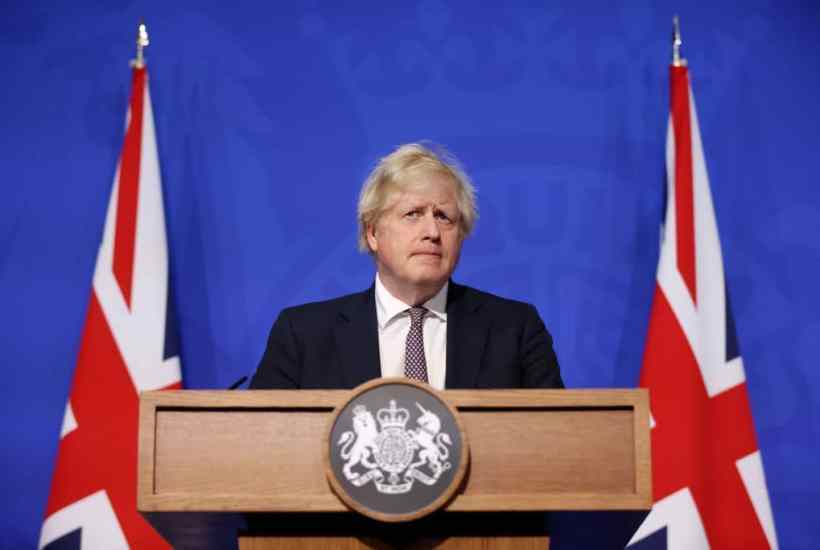Boris Johnson announced a new raft of coronavirus measures on Saturday, after two cases of the Omicron variant were detected in the UK. Face masks will soon be made mandatory in shops and on public transport and PCR tests compulsory for those travelling to the UK.
These new restrictions were revealed less than half a week after health authorities in South Africa informed the World Health Organisation of the discovery of the new Covid-19 variant, designated B.1.1.529 and now re-named Omicron. First isolated on 9 November, on Saturday two cases of the virus were detected in Britain, in Essex and Nottinghamshire.
Is Boris Johnson right to fear this new variant? In South Africa the appearance of the strain coincided with a steep increase in case numbers. That increase has not been firmly linked to Omicron, but based on the virus’s spread in Gauteng province, home to a quarter of South Africa’s population, it is tempting to conclude that the variant is indeed the cause. It is estimated that Omicron has a natural R-number of two. In the UK the latest estimate for the Delta variant is for an R-number of 1.0 to 1.1.
There may only have been a handful of confirmed Omicron infections in South Africa, but those confirmed cases are most likely just the tip of the iceberg.
We should be able to find out soon how many Omicron cases there are. In regular PCR tests you normally get a signal from three genes in the virus. An unusual feature of Omicron is that one of its genes – its spike protein – cannot be detected by these tests. This phenomenon, known as an S-gene target failure, allows you to identify the Omicron variant because each positive test only returns two, rather than three, signals. The WHO report that using this method – looking for an S-gene dropout – Omicron has been detected in almost every South African province and that it is growing at faster rates than previous infection surges.
It is hardly surprising that the Omicron variant has been detected in Britain already, especially considering the amount of travel between the two countries. South Africa played England in the rugby at Twickenham only last weekend. Even before it arrived on Britain’s shores, Omicron had already spread as far afield as Hong Kong and Israel. According to reports from Belgium the variant was isolated in a traveller 11 days after they returned from Egypt, via Turkey. In other words, this variant is endemic in several countries.
Omicron initially sparked the attention of scientists because it features a ‘constellation’ of 32 mutations that have built up in its spike protein. This molecule is the target of all the Covid-19 vaccines used in the UK. When our immune systems produce antibodies which stick to the spike so that it can no longer perform its function. It’s for this reason that mutations which could reduce antibody binding are observed very carefully.

The preliminary evidence suggests that there is an increased risk of reinfection with Omicron, so it seems that it’s somewhat resistant to immunity from infection. If that’s the case, I cannot see any reason why the same would not be true of immunity from a vaccine.
Similarly, the spike protein carries mutations which are thought to make the virus more transmissible. So it’s this possible double whammy of increased transmissibility and decreased sensitivity to immunity that has health authorities around the world scrambling. While there is absolutely no direct evidence of vaccine escape – an insensitivity to vaccine induced immunity – the mutations indicate that it is a distinct possibility. In an apparent effort to stop their country being cut off from the rest of the world, the South African government protested that most people infected with Omicron are unvaccinated, but that’s true of most people in South Africa. Overly simple excuses like that need to be taken with a pinch of salt.
The government has done the right thing by putting a group of southern African countries on the travel red list. Although the virus has already arrived in the UK, this will still slow its progress down. And while we won’t yet know how far the virus has spread in the UK, we can be pretty sure that there are no more than a handful of as yet unidentified cases, thanks to the S-gene target failure which will illuminate its arrival and spread.
My understanding is that there is grave concern within the UK Health Security Agency, the successor to Public Health England about this variant. There is a fear that Omicron could reduce vaccine efficacy to symptomatic infection by 40 per cent. Already manufacturers are gearing up to update their vaccines to protect against the strain. It’s a quirk of the pandemic that even though there have now been several Covid variants, all of the major vaccines still use the spike protein of the original Wuhan variant. For now this has been enough to stop the more recent Covid strains. When the first vaccines were rolled out, scientists hoped that it would be a simple procedure to tailor them for future variants. We are now potentially going to find out if that is possible.
But how far away is a revised vaccine? Pfizer have said that they could produce one within 100 days, Moderna within 60 to 90 days. That means we’re looking at late February at the earliest – and that’s before a booster programme can even begin. Between now and then we will still need to get through the worst of winter, when Covid-19 finds it easiest to spread. In the meantime, the dreaded spectre of more winter restrictions will loom larger thanks to Omicron.
No government wants to restrict people’s freedoms – especially during the Christmas holidays. But will they be prepared to let Christmas happen, and tidy up the mess in the New Year? We are about to find out.
<//>
Got something to add? Join the discussion and comment below.
Get 10 issues for just $10
Subscribe to The Spectator Australia today for the next 10 magazine issues, plus full online access, for just $10.




















Comments
Don't miss out
Join the conversation with other Spectator Australia readers. Subscribe to leave a comment.
SUBSCRIBEAlready a subscriber? Log in